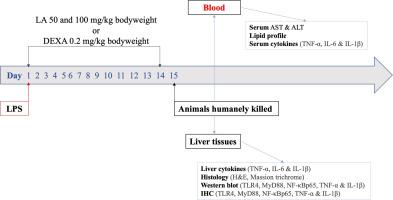Life Sciences ( IF 6.1 ) Pub Date : 2020-11-11 , DOI: 10.1016/j.lfs.2020.118750 Hidayat Ullah Khan , Khurram Aamir , Patricia Regina Jusuf , Gautam Sethi , Sreenivas Patro Sisinthy , Reena Ghildyal , Aditya Arya

|
Background
Lipopolysaccharide (LPS) is an endotoxin that leads to inflammation in many organs, including liver. It binds to pattern recognition receptors, that generally recognise pathogen expressed molecules to transduce signals that result in a multifaceted network of intracellular responses ending up in inflammation.
Aim
In this study, we used lauric acid (LA), a constituent abundantly found in coconut oil to determine its anti-inflammatory role in LPS-induced liver inflammation in Sprague Dawley (SD) rats.
Method
Male SD rats were divided into five groups (n = 8), injected with LPS and thereafter treated with LA (50 and 100 mg/kg) or vehicle orally for 14 days. After fourteen days of LA treatment, all the groups were humanely killed to investigate biochemical parameters followed by pro-inflammatory cytokine markers; tumour necrosis factor-α (TNF-α), interleukin-6 (IL-6), and IL-1β. Moreover, liver tissues were harvested for histopathological studies and evaluation of targeted protein expression with western blot and localisation through immunohistochemistry (IHC).
Results
The study results showed that treatment of LA 50 and 100 mg/kg for 14 days were able to reduce the elevated level of pro-inflammatory cytokines, liver inflammation, and downregulated the expression of TLR4/NF-κB mediating proteins in liver tissues.
Conclusion
These findings suggest that treatment of LA has a protective role against LPS-induced liver inflammation in rats, thus, warrants further in-depth investigation through mechanistic approaches in different study models.
中文翻译:

月桂酸通过介导Sprague Dawley(SD)大鼠的TLR4 / MyD88途径改善脂多糖(LPS)诱导的肝脏炎症。
背景
脂多糖(LPS)是一种内毒素,可导致包括肝脏在内的许多器官发炎。它与模式识别受体结合,该模式识别受体通常识别病原体表达的分子以转导信号,从而导致细胞内反应的多方面网络最终导致炎症。
目标
在这项研究中,我们使用了在椰子油中大量发现的月桂酸(LA),来确定其在LPS诱导的Sprague Dawley(SD)大鼠肝脏炎症中的抗炎作用。
方法
将雄性SD大鼠分为5组(n = 8),注射LPS,然后用LA(50和100mg / kg)或赋形剂口服治疗14天。LA治疗14天后,将所有组人道杀害以研究其生化参数,然后研究促炎性细胞因子标记。肿瘤坏死因子-α(TNF-α),白介素6(IL-6)和IL-1β。此外,收获肝组织用于组织病理学研究,并通过免疫印迹和免疫组织化学(IHC)定位来评估靶向蛋白的表达。
结果
研究结果表明,LA 50和100 mg / kg处理14天可以减少促炎细胞因子,肝炎的升高水平,并下调肝组织中TLR4 /NF-κB介导蛋白的表达。
结论
这些发现表明,LA的治疗对LPS诱导的大鼠肝脏炎症具有保护作用,因此,有必要通过不同研究模型中的机制方法进行进一步的深入研究。



























 京公网安备 11010802027423号
京公网安备 11010802027423号